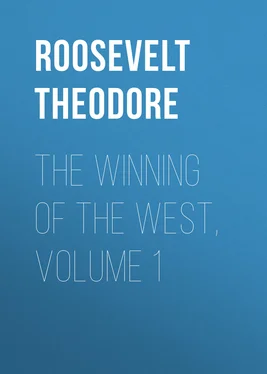Theodore Roosevelt - The Winning of the West, Volume 1
Здесь есть возможность читать онлайн «Theodore Roosevelt - The Winning of the West, Volume 1» — ознакомительный отрывок электронной книги совершенно бесплатно, а после прочтения отрывка купить полную версию. В некоторых случаях можно слушать аудио, скачать через торрент в формате fb2 и присутствует краткое содержание. Жанр: foreign_prose, История, foreign_edu, foreign_antique, на английском языке. Описание произведения, (предисловие) а так же отзывы посетителей доступны на портале библиотеки ЛибКат.
- Название:The Winning of the West, Volume 1
- Автор:
- Жанр:
- Год:неизвестен
- ISBN:нет данных
- Рейтинг книги:5 / 5. Голосов: 1
-
Избранное:Добавить в избранное
- Отзывы:
-
Ваша оценка:
- 100
- 1
- 2
- 3
- 4
- 5
The Winning of the West, Volume 1: краткое содержание, описание и аннотация
Предлагаем к чтению аннотацию, описание, краткое содержание или предисловие (зависит от того, что написал сам автор книги «The Winning of the West, Volume 1»). Если вы не нашли необходимую информацию о книге — напишите в комментариях, мы постараемся отыскать её.
The Winning of the West, Volume 1 — читать онлайн ознакомительный отрывок
Ниже представлен текст книги, разбитый по страницам. Система сохранения места последней прочитанной страницы, позволяет с удобством читать онлайн бесплатно книгу «The Winning of the West, Volume 1», без необходимости каждый раз заново искать на чём Вы остановились. Поставьте закладку, и сможете в любой момент перейти на страницу, на которой закончили чтение.
Интервал:
Закладка:
But they were superb individual fighters, beautifully drilled in their own discipline; 76 76 Harrison (loc. cit. ) calls them "the finest light troops in the world"; and he had had full experience in serving with American and against British infantry.
and they were favored beyond measure by the nature of their ground, of which their whole system of warfare enabled them to take the utmost possible benefit. Much has been written and sung of the advantages possessed by the mountaineer when striving in his own home against invaders from the plains; but these advantages are as nothing when weighed with those which make the warlike dweller in forests unconquerable by men who have not his training. A hardy soldier, accustomed only to war in the open, will become a good cragsman in fewer weeks than it will take him years to learn to be so much as a fair woodsman; for it is beyond all comparison more difficult to attain proficiency in woodcraft than in mountaineering. 77 77 Any one who is fond of the chase can test the truth of this proposition for himself, by trying how long it will take him to learn to kill a bighorn on the mountains, and how long it will take him to learn to kill white-tail deer in a dense forest, by fair still-hunting, the game being equally plenty. I have known many novices learn to equal the best old hunters, red or white, in killing mountain game; I have never met one who could begin to do as well as an Indian in the dense forest, unless brought up to it—and rarely even then. Yet, though woodcraft is harder to learn, it does not imply the possession of such valuable qualities as mountaineering; and when cragsman and woodman meet on neutral ground, the former is apt to be the better man.
The Wyandots, and the Algonquins who surrounded them, dwelt in a region of sunless, tangled forests; and all the wars we waged for the possession of the country between the Alleghanies and the Mississippi were carried on in the never-ending stretches of gloomy woodland. It was not an open forest. The underbrush grew, dense and rank, between the boles of the tall trees, making a cover so thick that it was in many places impenetrable, so thick that it nowhere gave a chance for human eye to see even as far as a bow could carry. No horse could penetrate it save by following the game trails or paths chopped with the axe; and a stranger venturing a hundred yards from a beaten road would be so helplessly lost that he could not, except by the merest chance, even find his way back to the spot he had just left. Here and there it was broken by a rare hillside glade or by a meadow in a stream valley; but elsewhere a man might travel for weeks as if in a perpetual twilight, never once able to see the sun, through the interlacing twigs that formed a dark canopy above his head.
This dense forest was to the Indians a home in which they had lived from childhood, and where they were as much at ease as a farmer on his own acres. To their keen eyes, trained for generations to more than a wild beast's watchfulness, the wilderness was an open book; nothing at rest or in motion escaped them. They had begun to track game as soon as they could walk; a scrape on a tree trunk, a bruised leaf, a faint indentation of the soil, which the eye of no white man could see, all told them a tale as plainly as if it had been shouted in their ears. 78 78 To this day the wild—not the half-tame—Indians remain unequalled as trackers. Even among the old hunters not one white in a hundred can come near them. In my experience I have known a very few whites who had spent all their lives in the wilderness who equalled the Indian average; but I never met any white who came up to the very best Indian. But, because of their better shooting and their better nerve, the whites often make the better hunters.
With moccasined feet they trod among brittle twigs, dried leaves, and dead branches as silently as the cougar, and they equalled the great wood-cat in stealth and far surpassed it in cunning and ferocity. They could no more get lost in the trackless wilderness than a civilized man could get lost on a highway. Moreover, no knight of the middle ages was so surely protected by his armor as they were by their skill in hiding; the whole forest was to the whites one vast ambush, and to them a sure and ever-present shield. Every tree trunk was a breastwork ready prepared for battle; every bush, every moss-covered boulder, was a defence against assault, from behind which, themselves unseen, they watched with fierce derision the movements of their clumsy white enemy. Lurking, skulking, travelling with noiseless rapidity, they left a trail that only a master in woodcraft could follow, while, on the other hand, they could dog a white man's footsteps as a hound runs a fox. Their silence, their cunning and stealth, their terrible prowess and merciless cruelty, makes it no figure of speech to call them the tigers of the human race.
Unlike the southern Indians, the villages of the northwestern tribes were usually far from the frontier. Tireless, and careless of all hardship, they came silently out of unknown forests, robbed and murdered, and then disappeared again into the fathomless depths of the woods. Half of the terror they caused was due to the extreme difficulty of following them, and the absolute impossibility of forecasting their attacks. Without warning, and unseen until the moment they dealt the death stroke, they emerged from their forest fastnesses, the horror they caused being heightened no less by the mystery that shrouded them than by the dreadful nature of their ravages. Wrapped in the mantle of the unknown, appalling by their craft, their ferocity, their fiendish cruelty, they seemed to the white settlers devils and not men; no one could say with certainty whence they came nor of what tribe they were; and when they had finished their dreadful work they retired into a wilderness that closed over their trail as the waves of the ocean close in the wake of a ship.
They were trained to the use of arms from their youth up, and war and hunting were their two chief occupations, the business as well as the pleasure of their lives. They were not as skilful as the white hunters with the rifle 79 79 It is curious how to this day the wild Indians retain the same traits. I have seen and taken part in many matches between frontiersmen and the Sioux, Cheyennes, Grosventres, and Mandans, and the Indians were beaten in almost every one. On the other hand the Indians will stand fatigue, hunger, and privation better, but they seem more susceptible to cold.
—though more so than the average regular soldier,—nor could they equal the frontiersman in feats of physical prowess, such as boxing and wrestling; but their superior endurance and the ease with which they stood fatigue and exposure made amends for this. A white might outrun them for eight or ten miles; but on a long journey they could tire out any man, and any beast except a wolf. Like most barbarians they were fickle and inconstant, not to be relied on for pushing through a long campaign, and after a great victory apt to go off to their homes, because each man desired to secure his own plunder and tell his own tale of glory. They are often spoken of as undisciplined; but in reality their discipline in the battle itself was very high. They attacked, retreated, rallied or repelled a charge at the signal of command; and they were able to fight in open order in thick covers without losing touch of each other—a feat that no European regiment was then able to perform.
On their own ground they were far more formidable than the best European troops. The British grenadiers throughout the eighteenth century showed themselves superior, in the actual shock of battle, to any infantry of continental Europe; if they ever met an over-match, it was when pitted against the Scotch highlanders. Yet both grenadier and highlander, the heroes of Minden, the heirs to the glory of Marlborough's campaigns, as well as the sinewy soldiers who shared in the charges of Prestonpans and Culloden, proved helpless when led against the dark tribesmen of the forest. On the march they could not be trusted thirty yards from the column without getting lost in the woods 80 80 See Parkman's "Conspiracy of Pontiac"; also "Montcalm and Wolfe."
—the mountain training of the highlanders apparently standing them in no stead whatever,—and were only able to get around at all when convoyed by backwoodsmen. In fight they fared even worse. The British regulars at Braddock's battle, and the highlanders at Grant's defeat a few years later, suffered the same fate. Both battles were fair fights; neither was a surprise; yet the stubborn valor of the red-coated grenadier and the headlong courage of the kilted Scot proved of less than no avail. Not only were they utterly routed and destroyed in each case by an inferior force of Indians (the French taking little part in the conflict), but they were able to make no effective resistance whatever; it is to this day doubtful whether these superb regulars were able, in the battles where they were destroyed, to so much as kill one Indian for every hundred of their own men who fell. The provincials who were with the regulars were the only troops who caused any loss to the foe; and this was true in but a less degree of Bouquet's fight at Bushy Run. Here Bouquet, by a clever stratagem, gained the victory over an enemy inferior in numbers to himself; but only after a two days' struggle in which he suffered a fourfold greater loss than he inflicted. 81 81 Bouquet, like so many of his predecessors and successors, greatly exaggerated the numbers and loss of the Indians in this fight. Smith, who derived his information both from the Indians and from the American rangers, states that but eighteen Indians were killed at Bushy Run.
Интервал:
Закладка:
Похожие книги на «The Winning of the West, Volume 1»
Представляем Вашему вниманию похожие книги на «The Winning of the West, Volume 1» списком для выбора. Мы отобрали схожую по названию и смыслу литературу в надежде предоставить читателям больше вариантов отыскать новые, интересные, ещё непрочитанные произведения.
Обсуждение, отзывы о книге «The Winning of the West, Volume 1» и просто собственные мнения читателей. Оставьте ваши комментарии, напишите, что Вы думаете о произведении, его смысле или главных героях. Укажите что конкретно понравилось, а что нет, и почему Вы так считаете.












